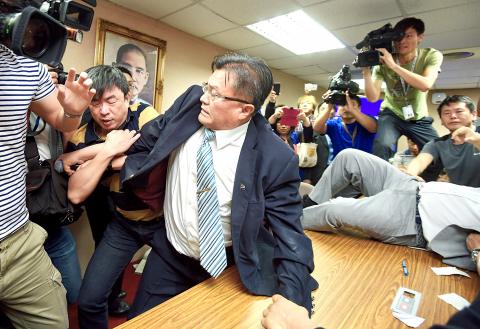A legislative review of draft acts to reform the civil servants’ pension plan reached some conclusions yesterday despite brawls and procedural disruptions.
Several clauses of the draft acts proposed by the Examination Yuan, Democratic Progressive Party (DPP), the New Power Party and the People First Party were agreed upon during a meeting of the Judiciary and Organic Laws and Statutes Committee yesterday.
There was an extensive debate over the base figure for the calculation of income replacement rate, the minimum pension level, pension contribution rates, parental benefits and the government responsibility for pension payment.

Photo: Chien Jung-fong, Taipei Times
The base figure for the calculation of the income replacement rate was determined to be “two times a civil servant’s basic salary,” but the committee did not decide on the minimum pension level, saying that it should be decided upon in cross-caucus negotiations.
The committee also did not reach consensus on how much the government should help civil servants taking parental leave in paying for their pension premiums to boost the nation’s falling birth rate.
A fight erupted between DPP and Chinese Nationalist Party (KMT) lawmakers after DPP Legislator Tuan Yi-kang (段宜康), a co-convener of the committee, rejected the KMT caucus’ request to have Ministry of Justice officials attend the meeting to provide legal advice on the wording of a clause because Legislative Research Bureau officials were already in attendance.
KMT lawmakers stormed the podium, and tempers flared as KMT Legislator Yosi Takun (孔文吉) scuffled with Tuan as he tried to seize Tuan’s microphone.
The meeting was adjourned for nearly an hour until a ministry official arrived.
Even before that, KMT lawmakers had tried to delay the discussion, first with a series of procedural maneuvers and then a series of extended speeches that took up most of the morning.
The seven motions raised by the KMT caucus included ending the review at 5:30pm to prevent Legislative Yuan staff having to work overtime on Workers’ Day; postponing the review until the Executive Yuan and the Examination Yuan report to the legislature on pension issues; that the government announce long-term reform plans to keep the pension funds afloat for at least 30 years; and for a constitutional interpretation to be sought on conflicting reform proposals.
The DPP majority on the committee was able to reject the KMT motions.
Saying that it did not oppose the reform, the KMT said the principle of legitimate expectation needed to be recognized.
Some of the proposals might breach legitimate expectations, as civil servants “decided to take government jobs under the presumption that they would be entitled to retirement benefits guaranteed by the existing system,” KMT Legislator Lin Te-fu (林德福) said.

PREPAREDNESS: Given the difficulty of importing ammunition during wartime, the Ministry of National Defense said it would prioritize ‘coproduction’ partnerships A newly formed unit of the Marine Corps tasked with land-based security operations has recently replaced its aging, domestically produced rifles with more advanced, US-made M4A1 rifles, a source said yesterday. The unnamed source familiar with the matter said the First Security Battalion of the Marine Corps’ Air Defense and Base Guard Group has replaced its older T65K2 rifles, which have been in service since the late 1980s, with the newly received M4A1s. The source did not say exactly when the upgrade took place or how many M4A1s were issued to the battalion. The confirmation came after Chinese-language media reported

The Taiwanese passport ranked 33rd in a global listing of passports by convenience this month, rising three places from last month’s ranking, but matching its position in January last year. The Henley Passport Index, an international ranking of passports by the number of designations its holder can travel to without a visa, showed that the Taiwan passport enables holders to travel to 139 countries and territories without a visa. Singapore’s passport was ranked the most powerful with visa-free access to 192 destinations out of 227, according to the index published on Tuesday by UK-based migration investment consultancy firm Henley and Partners. Japan’s and

A Ministry of Foreign Affairs official yesterday said that a delegation that visited China for an APEC meeting did not receive any kind of treatment that downgraded Taiwan’s sovereignty. Department of International Organizations Director-General Jonathan Sun (孫儉元) said that he and a group of ministry officials visited Shenzhen, China, to attend the APEC Informal Senior Officials’ Meeting last month. The trip went “smoothly and safely” for all Taiwanese delegates, as the Chinese side arranged the trip in accordance with long-standing practices, Sun said at the ministry’s weekly briefing. The Taiwanese group did not encounter any political suppression, he said. Sun made the remarks when

BROAD AGREEMENT: The two are nearing a trade deal to reduce Taiwan’s tariff to 15% and a commitment for TSMC to build five more fabs, a ‘New York Times’ report said Taiwan and the US have reached a broad consensus on a trade deal, the Executive Yuan’s Office of Trade Negotiations said yesterday, after a report said that Washington is set to reduce Taiwan’s tariff rate to 15 percent. The New York Times on Monday reported that the two nations are nearing a trade deal to reduce Taiwan’s tariff rate to 15 percent and commit Taiwan Semiconductor Manufacturing Co (TSMC, 台積電) to building at least five more facilities in the US. “The agreement, which has been under negotiation for months, is being legally scrubbed and could be announced this month,” the paper said,